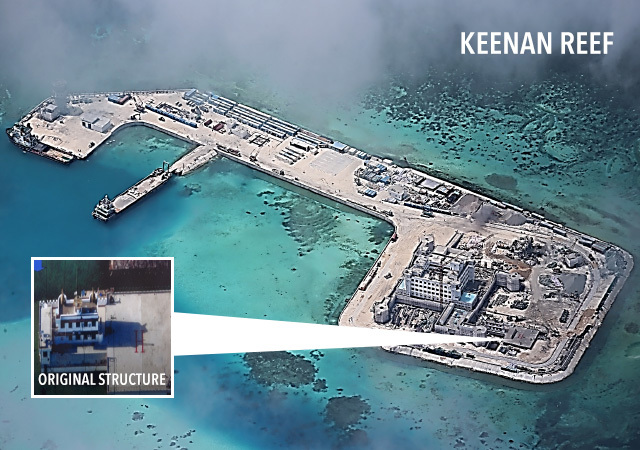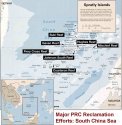You are using an out of date browser. It may not display this or other websites correctly.
You should upgrade or use an alternative browser.
You should upgrade or use an alternative browser.
PLAN SCS Bases/Islands/Vessels (Not a Strategy Page)
- Thread starter lilzz
- Start date
joshuatree
Captain
This one is mislabelled (should be Hughes Reef)

Where exactly is Keenan Reef? Or is that their name for Hughes?
Where exactly is Keenan Reef? Or is that their name for Hughes?
McKennan Reef (West Gate in Chinese) is directly west of Hughes Reef (East Gate in Chinese) (See map @). McKennan Reef is virtually occupied by China ()
I have an excellent photo album on Flickr, and an in depth desctiption of the PRC's Reclamation efforts in the South China Sea.
If focuses on all seven major PRC reclamation projects showing current photos of the islands, and allowing you yto compare what you see now to the small structures that the PRC had in each location in 2012 or earlier.
.Amazing pictures and an amazing construction effort by the PRC in the south China Sea.
If focuses on all seven major PRC reclamation projects showing current photos of the islands, and allowing you yto compare what you see now to the small structures that the PRC had in each location in 2012 or earlier.
.Amazing pictures and an amazing construction effort by the PRC in the south China Sea.
China's major efforts in reclamations are about the whole of the Spratlys. One question: Why is China reclaiming so many reefs if not for its own nationalistic and security interests? The South China Sea has always been a Free International Seaway, with about US$5 trillion worth of trade passing thru it annually for many years without being pried upon by any country. There has never been such controls or claims (historically or otherwise) in other international waters: Examples - India for the Indian Ocean or the Mediterranean Sea by European Countries or US. China should realise the reasons why majority of countries in the region (though some are silent about it) are very unhappy and wary about PLA-N expansion and presence in these waters. Time to be transparent and negotiate peacefully under the auspices of the UN to help deescalate growing tension in the region.
Equation
Lieutenant General
China's major efforts in reclamations are about the whole of the Spratlys. One question: Why is China reclaiming so many reefs if not for its own nationalistic and security interests? The South China Sea has always been a Free International Seaway, with about US$5 trillion worth of trade passing thru it annually for many years without being pried upon by any country. There has never been such controls or claims (historically or otherwise) in other international waters: Examples - India for the Indian Ocean or the Mediterranean Sea by European Countries or US. China should realise the reasons why majority of countries in the region (though some are silent about it) are very unhappy and wary about PLA-N expansion and presence in these waters. Time to be transparent and negotiate peacefully under the auspices of the UN to help deescalate growing tension in the region.
Replace the word "China" and put in Vietnam, Philippines, and others.
China's major efforts in reclamations are about the whole of the Spratlys. One question: Why is China reclaiming so many reefs if not for its own nationalistic and security interests? The South China Sea has always been a Free International Seaway, with about US$5 trillion worth of trade passing thru it annually for many years without being pried upon by any country. There has never been such controls or claims (historically or otherwise) in other international waters: Examples - India for the Indian Ocean or the Mediterranean Sea by European Countries or US. China should realise the reasons why majority of countries in the region (though some are silent about it) are very unhappy and wary about PLA-N expansion and presence in these waters. Time to be transparent and negotiate peacefully under the auspices of the UN to help deescalate growing tension in the region.
I won't try to speak for the Indian Ocean or the Mediterranean, however the South China sea features many overlapping claims by regional countries, which stretches beyond their EEZs. China is not unique in this aspect, China simply has the largest claim and is able to enforce it most easily.
China has also never stated that it is seeking to interfere with freedom of navigation of the SCS. Having a significant military presence does not mean one is seeking to interfere with FON. If anything a greater Chinese military presence is seeking to maintain FON.
The problem is that some nations in the region are not on good terms with China, therefore a military dispute could result in the involved countries trying to attack each other's shipping. The US itself has discussed the concept of Off Shore Control which is an effective blockade against China (obviously not conducive to FON) and the procurement of various platforms such as submarines by Vietnam, means there is a greater threat to Chinese shipping.
In other words, every nation is interested in securing FON for their own shipping and for the shipping of friendly countries, but will also seek to control the shipping of opposing countries. Again, China is not unique in this aspect.
The South China Sea has been the realm of the USN for decades. We've reached a point where China is now seeking to be able to protect its own shipping.
Blitzo, there was never a problem of FON in the South China Sea. Your remarks "China simply has the largest claim and is able to enforce it most easily" highlights that the PLA-N is capable of enforcing sanctions/barring entry into the South China Sea, according to the dictates of the Chinese Government. That is the current problem which encourages the US and its allied countries to patrol these waters regardless of China's claims. I repeat that it's time to negotiate peacefully under UN/International law, and not for China to bulldoze its way in this matter.
Blitzo, there was never a problem of FON in the South China Sea. Your remarks "China simply has the largest claim and is able to enforce it most easily" highlights that the PLA-N is capable of enforcing sanctions/barring entry into the South China Sea, according to the dictates of the Chinese Government. That is the current problem which encourages the US and its allied countries to patrol these waters regardless of China's claims. I repeat that it's time to negotiate peacefully under UN/International law, and not for China to bulldoze its way in this matter.
FON is never a problem for anyone, if problems and conflict and underlying disputes are resolved.
If China and the US go to war and the US has control over the SCS then FON for Chinese shipping will be a problem. If China and Japan go to war and China has control over SCS then FON for Chinese shipping will be a problem.
In other words, to fully resolve the FON problem, one needs to build mutual trust and look at the underlying issues.
The fact that the US is claiming that China is a threat to FON is because China has differing interests and have areas of potential conflict with the US and some of its allies in the region, therefore believe greater Chinese military presence could threaten the shipping of its allies. Of course the fact also exists that the US has the immense capability of threatening Chinese FON in the area as well.
Therefore for the purposes of discussion, the subject of "Freedom of Navigation" is a misleading one, because every country with a coast is interested in Freedom of Navigation for their own shipping and the shipping of its (economic or military) partners, and saying a country is a "threat" to Freedom of Navigation ignores the reasons and the particular situations for why a country may feel the need to threaten Freedom of Navigation of some countries.
I propose, that instead of saying "country X is threatening freedom of navigation" which is a general phrase lacking clarity or rationale for why country X may threaten freedom of navigation, and lacking overall context, better say "country X is increasing the ability to protect its own shipping and (economic and/or military) partners, and increasing the ability to threaten the shipping of country Y (a potential adversary of country X)".
This way, the phrase is more neutral, objective and can be applied to any country in a fair and equal way.
Last edited:
Brumby
Major
FON is never a problem for anyone, if problems and conflict and underlying disputes are resolved.
If China and the US go to war and the US has control over the SCS then FON for Chinese shipping will be a problem. If China and Japan go to war and China has control over SCS then FON for Chinese shipping will be a problem.
Sorry mate you are conflating two distinct issues as if one is the cause of the other. FON is a long established principle that predates UNCLOS. The underlying problem in the SCS is because there are competing claims and unresolved questions of jurisdiction. China's nebulous claims and unilateral application of rules is adding confusion to the picture. The CNN overflight story was a window to the world as an example of China's attempt at restricting FON. It is no accident that the story was captured by CNN as one would easily conclude previous attempts of restriction was happening and CNN's presence was to showcase to the world what was in fact happening with FON.
It is a problem because China made it a problem and not because of FON.

